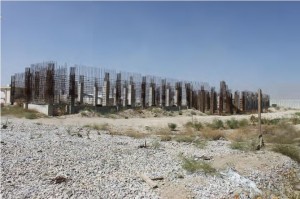US Priorities at Parwan: $60 Million Prison Built Quickly, $2.7 Million Courthouse Languished
In a report issued today (pdf), SIGAR provides details on how a project to build a courthouse at the Parwan complex languished with incompetent construction and poor oversight. It was only after SIGAR provided a draft version of their report that the contracting authority changed the status of their stop-work order from one that would have allowed the contractor to receive the rest of the funds without completing the work to a status that prevented a huge financial reward for shoddy and incomplete work.
But this courthouse project does not sit in isolation. The Parwan complex, and its predecessor, the prison at Bagram, have a deep history that provides a microcosm of the atrocities and incompetence that the US war in Afghanistan has come to represent. Never forget that it was at Bagram where Joshua Claus murdered innocent taxi driver Dilawar. Dilawar was murdered at Bagram only a few short days after Habibullah was murdered there, as well. But the US had grand plans for the Bagram air base complex. From the background section of the SIGAR report:
The U.S. and Afghan governments signed a Letter of Agreement in 2006 that committed to improve governance by enhancing the administration of justice and rule of law. A key element in implementing this strategy was the development of a criminal justice facility known as the Justice Center in Parwan (JCIP). JCIP was designed to provide a secure facility for transferring Afghan combatants from U.S. military custody into the Afghan criminal justice system. The U.S. government was to assist with building, equipping, and operating the JCIP, as well as mentoring and training Afghan government personnel assigned to the facility. JCIP was planned as a complex of 11 buildings—a courthouse, offices, laboratory facilities, meeting hall, and housing—located adjacent to the existing Parwan Detention Facility, which is next to the Bagram Airfield north of Kabul. The courthouse was expected to be the centerpiece for Afghan national security trials.
But even though there was a detention facility at Parwan when that agreement was signed in 2006, the US quickly saw that its plans to detain thousands of Afghan citizens meant that a much bigger prison was needed. And indeed, a shiny new $60 million prison was opened in 2010. And yet, the contract on the courthouse at Parwan wasn’t signed until 2011:
On June 13, 2011, DOD’s Bagram Regional Contracting Center (BRCC) 3 awarded a $2.38 million firm fixedprice contract (W91B4N-11-C-8066) to CLC Construction Company (CLC) to build a courthouse at the JCIP complex.4 The design documents called for construction of a 2-story courthouse, including 4 courtrooms, 6 judge’s chambers, 23 individual offices, and 4 holding cells. CLC was given 155 days to complete the project after the notice to proceed was issued on July 16, 2011. The contract also required CLC to perform engineering, review, verification, and concept design functions. On November 11, 2011, the contract was modified to increase the height of the courthouse ceilings and, as a result, the contract value was increased from $2.38 million to $2.67 million.
It does seem that 155 days is a very short time frame for a construction project of over $2 million, especially if engineering and concept design are also included. But CLC fell behind immediately and what work they did was ridiculously incompetent: Read more →

